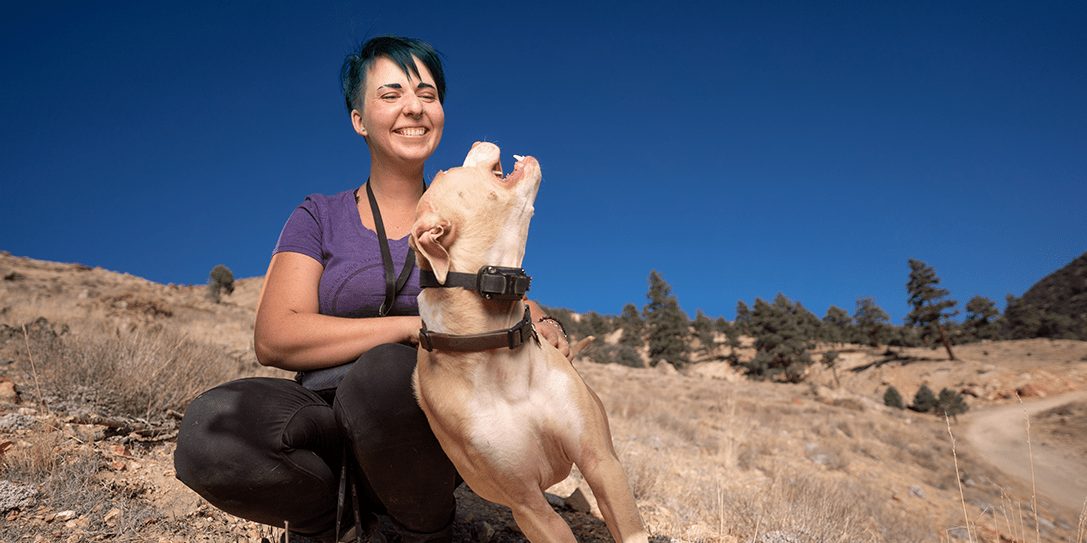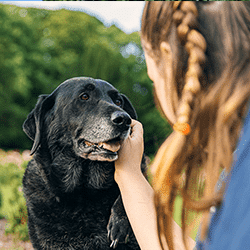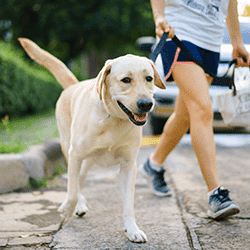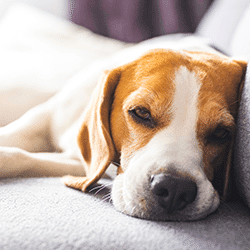
A major misconception people have about dog training is viewing it as a one-time task or accomplishment that can be checked off a list. While a dog training program covers a LOT of groundwork and basics, there isn’t a magical, permanent switch clicks from “untrained” to “trained” forever.
Soon after completing a training program, your dog will learn many new skills and behaviors, and you will enjoy the benefits of training long after. But, just like humans, dogs need to refresh their learning and adapt to new ideas regularly. As time goes on, you’ll find it simply isn’t enough to have completed a dog training program one time three years ago. Because, just like people, dogs change.
3 Reasons Why Dog Training Is A Lifestyle And Not A “One And Done” Process
 1. They get older
1. They get older
Just like people, dogs get older. Whether your dog was trained as a puppy or as an adult, as they age, they change.
A puppy who might have aced their Puppy Training Program final might remember the core ideas and behaviors but could develop new, unwanted behavior as they age. Maybe their little puppy legs went through a couple of growth spurts, putting the garbage can at perfect snout-height, and they simply can’t resist the calls of that leftover lasagna inside—or whatever daily special is on the menu at Buffet De Garbàge).
Or, maybe dog training really helped when your pup was two years old, but now that they are seven, they are a little bit moodier and have developed a habit of growling at the kids.
Changes in age mean changes in temptation and temperament. And while we’d love to claim that even our training programs are the end all be all, it simply isn’t possible. As dogs age, they change and will need a few refresher courses from time to time.
 2. Their Routine or Environment Changes
2. Their Routine or Environment Changes
Many pet owners underestimate the effects their lifestyle changes can have on their dogs. Just like humans, dogs develop routines, and they get used to the way things are. Change is a natural part of life, and it’s not unusual for a human to rearrange the furniture, get a new plant, change jobs, decide to change their walk time from 8 a.m. to 4 p.m., or to *gulp* have a baby (or 2 or 3!) When these changes happen in your world, they influence your dog—sometimes for the better and sometimes, not.
Maybe your recent schedule changes mean a few fewer walks per week. As a result, your pup may have less time to release their energy in healthy ways and more time to get creative with your brand-new shoes.
A new baby sure demands a LOT of attention, which could mean less snuggle time and very little exercise for your fur baby. Every dog responds differently to change. For some, it could mean anxiousness or attention-getting behavior rear their ugly heads. Now you have two messes to clean up—those dirty diapers and that magazine your dog chewed up all over the rug for apparently no reason.
Changes in routine and environment naturally invite changes in behavior for your dog. So when change happens, a new round of dog training can help Fido curb unwanted behaviors and remember their good manners.
 3. You get out of practice with your dog training
3. You get out of practice with your dog training
Like your dog, you may also get out of practice when changes wreak havoc on your life. If you’ve been through a dog training program, then you know that your furry friend isn’t the only one learning new tricks. You also understand how your behaviors influence your dog and what you need to do to support your pup.
There’s a honeymoon phase after you complete your first round of dog training. It’s kind of like when you get a new car. It has that fresh car smell, the carpets are pristine, and you’re stoked on your new seat warmers. At first, you tell yourself, “I’m going to keep it clean, no garbage, and no one is leaving their sports sneakers in the back seat!” You may keep the good habits up for a while, but it isn’t too long before there are fossilized French fries in between the cracks of the seats and “nose art” from your dogs on the back windows.
When your training program is complete, you may have a great habit of practicing the commands, but, over time, some commands may get far less practice or fall away entirely. Brush-up training is essential to revive the positive skills and behaviors dog training teaches and keep that knowledge fresh.
There you have it, our six dog training tips to help your pup adjust to this new normal. Now, if we could only write the same thing for humans!
Getting Back On Track With Dog Training
Training is important at every stage of life, especially when routines change and significant life events happen. Dog Gone Amazing Education Center offers brush-up dog training lessons, or you can always enroll for another round of training sessions to refresh your training or learn new skills. From Board & Train to In-Home Training, we offer various dog training programs that will fit your life and get you and your pup back into tip-top shape.
